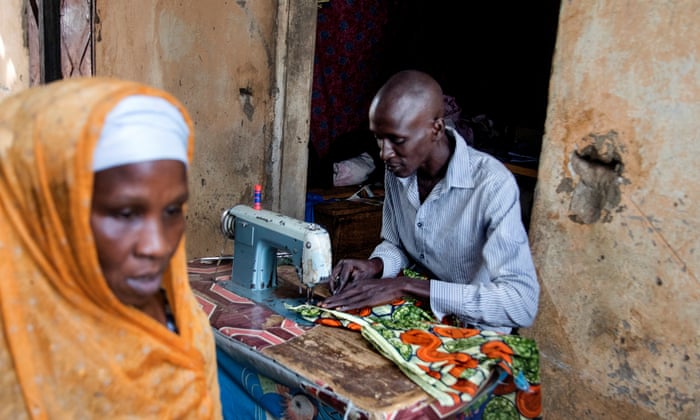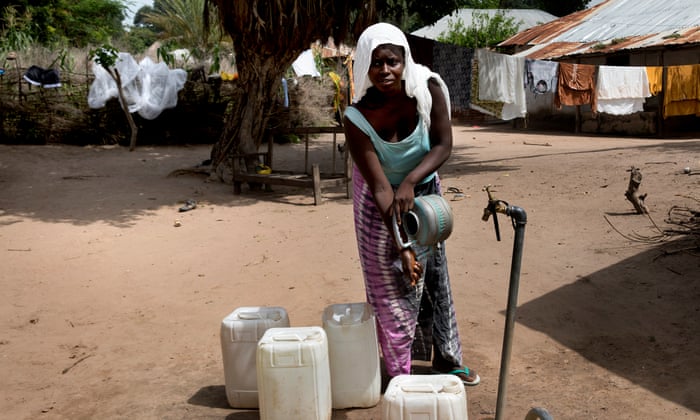
When the news filtered back to the Gambia that another of its sons had died after an epic odyssey to Europe, the response was not as you might expect.
There was grief and mourning, of course, at the passing of Sleiman Danso.
And then his family urged his younger brother to make the same perilous journey.
“When my brother Sleiman died, it was Allah’s will,” said his oldest brother, Ebrima Danso, a melon farmer from Sabaa, deep in the Gambian interior. And yet he had no qualms about sending another family member north.
“If he makes it, he can secure the survival of our mother and the rest of the family,” Danso said. “If he doesn’t, it is the will of Allah. I leave everything in the hands of Allah.”
The youngest brother made it to Libya, where he was kidnapped by militants. He hasn’t been heard of since Ramadan ended in June, Danso said.
People in the west have watched appalled as the migration tragedy has unfolded in recent years. With each deadly episode in the Mediterranean, the same question surfaces: don’t people know what they are risking?
The answer, from this Gambian village at least, is yes, of course they know. But still they come. They see no alternative.
Gathered in the shade in front of a small grocery shop selling bags of rice and little else, older villagers point to hard economic necessity. Danso simply noted: when Sleiman died in Italy, the flow of remittances that allowed his family to survive ended too.
 Miriam Manneh’s husband reached Europe seven years ago but is unable to invite her and their eight-year-old daughter to join him because he does not have the right documentation. If a resolution does not come soon, Miriam intends to travel there illegally. Photograph: Finn Frandsen/POLFOTO
Miriam Manneh’s husband reached Europe seven years ago but is unable to invite her and their eight-year-old daughter to join him because he does not have the right documentation. If a resolution does not come soon, Miriam intends to travel there illegally. Photograph: Finn Frandsen/POLFOTO
Wasasi Singhateh is the father of three sons. He said two of them died on board a people-smuggling ship when the fuel supply caught fire. Fifty of the 150 passengers burned to death or drowned as they tried to escape the burning petrol.
“Of course, I wouldn’t want my sons to take such risks. Nobody wants that. But there is no other way for our families to survive,” said Singhateh.
His third son made it to Spain. He will send back €50 whenever he can, usually once every month. Just enough for a bag a rice for the family in Sabaa to live on.
With a population of 2 million, the Gambia is the smallest country in Africa. Yet Gambians are in the top five nationalities to cross the Mediterranean to Italy. In the first six months of this year, 4,920 Gambians reached Italy, by far the highest number per capita.
Remittances have grown fourfold over the past 10 years and now make up a staggering 22% of the Gambian GDP, according to World Bank estimates. By comparison, the entire agricultural sector, providing income for 70% of the population, accounts for 30% of GDP.
The high level of migration from the Gambia and other countries in west Africa takes a toll on the development prospects of the countries, said Ada Lekoetje, the UN resident coordinator, overseeing relations between UN organisations and the government in the Gambia.
“In some areas, virtually all the youth are gone. After the exodus, you don’t have the requisite labour in the agricultural sector,” she said.
Economic hardship is the main, but no longer the only driver of migration. “It is also an attitude,” the UN coordinator said, a view echoed by economic analysts, development NGOs and youth activists.
Migrants have even replaced doctors and lawyers as role models in the country, said Omar Badjie, the Gambia director of ActionAid, a development NGO.
“People with relatively good jobs leave too, be it teachers, soldiers, police officers, even government officials. They simply resign and disappear. The effects are felt everywhere,” Badjie said.
In the last few months, however, the number of migrants has dropped dramatically, said Moussa Dibba, head of the migration division in Farafenni, a key crossing point to neighbouring Senegal.
In large part that is because it has become difficult to get out of Libya, but also, he insisted, because the government has gained support from the international community to stop the flow at the source.
“Six months ago, traffickers would gather 50 new migrants every day and take off with a full bus. I dare say that business model has collapsed,” the commander said.
“Now we stop them, if we believe they intend to migrate. On a normal day, seven to 10 are intercepted and returned home.”
Information campaigns aimed at would-be migrants stress the hardships and the high risk of failing.
The international community supports the effort, said the UN coordinator. “For a long time, people here have only focused on the 5-10% who made it to Europe. We need to tell the full story and focus on the 90% or more who reach Europe only to face hardship, or who never get there at all,” said Lekoetje.
“It may not dissuade everybody, but at least they will know about the odds before they make the decision to go.”
Papa Ndiaye, a tailor in Farafenni, wasn’t dissuaded by failure, though. At the first attempt three years ago, he ran out of money even before he reached the Sahara and had to return empty handed.
Working an antique sewing machine in a small alley, he is now saving enough money to have another go. “I need to. There is nothing here. I can sew but people cannot pay. That’s the problem,” he said.
In Banjul, the capital, five young men and women are gathered in a small office to plan the next move in their campaign to discourage their fellow youths from migrating.
The government and the international community are relying on groups like Activista to spread the message. They mobilise returnees to come forward and give their account of hardships endured and the high probability of capture and return to the Gambia. They also mobilise successful young Gambians to demonstrate a viable alternative.
But often the real issue is not the mindset of young people but rather that of their parents, especially the mothers, the group has found – confirming personal experience.
“All of us are under pressure to leave,” said the 26-year-old activist Fatou Fofene.
“For mothers, it has become a matter of prestige to have their kids in Europe. They have no respect for young people who decide to stay here,” she said.
Mothers can use all sorts of tactics. Some openly call their offspring useless, ridiculing the financial contribution they bring home to the family. Others are subtler, giving little or no attention to the kids at home while praising the ones who left, either to their own family or to the neighbours.
“That, too, can be very persuasive in our culture,” said Forfene.
source: The Guardian